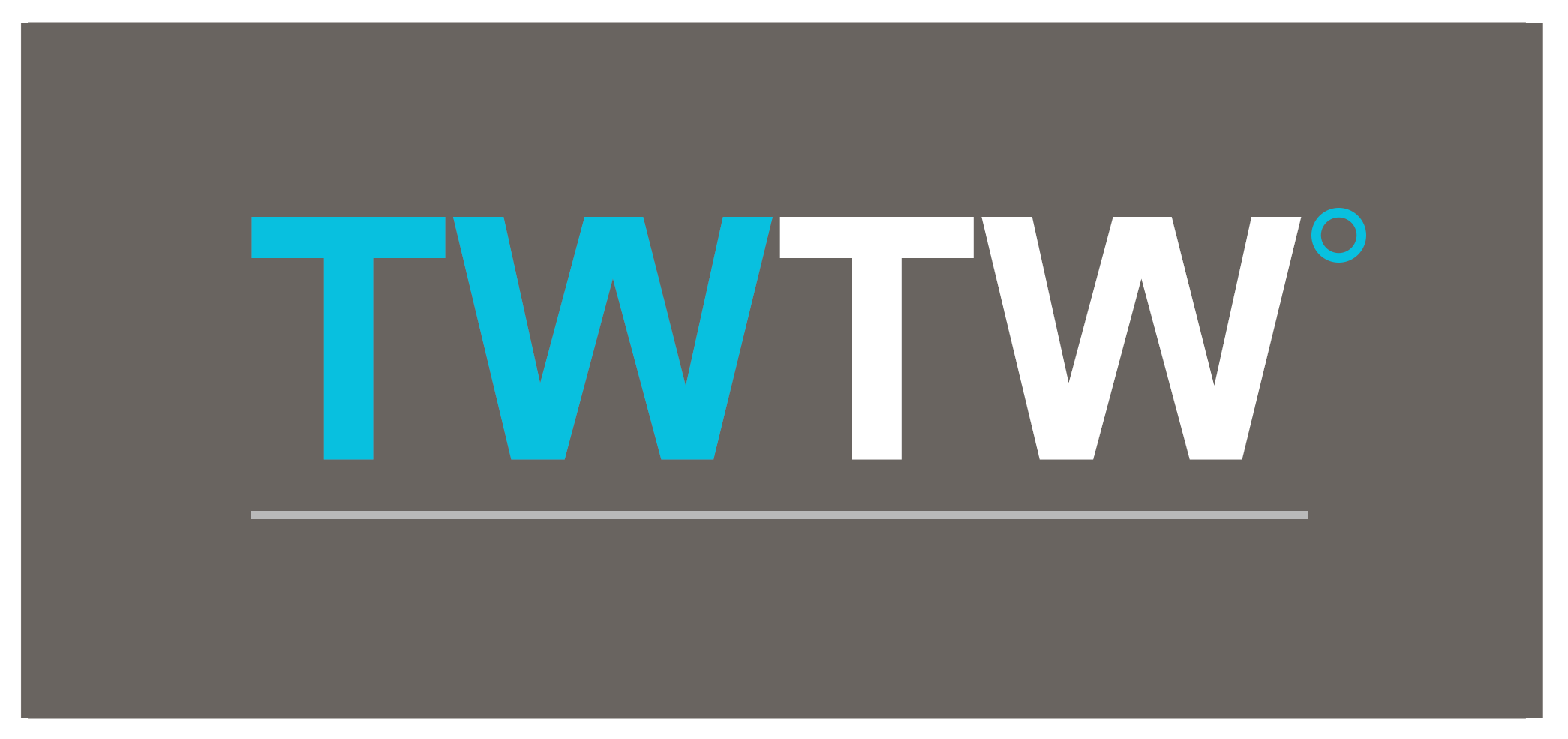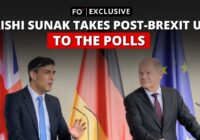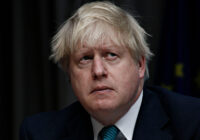Sometimes, David beats Goliath and, when that happens, few places celebrate the victory of the underdog the way the UK does.
This week, the fifth of eight children of a bus driver and a seamstress who grew up on a council estate and went to a rough school was elected the mayor of London. His name is Sadiq Khan and he is “very comfortable being a Brit, being a Muslim and being a Londoner.” He beat Zac Goldsmith, a billionaire heir and an Old Etonian. This is the most remarkable story of British social mobility since the Dick Whittington of legend became “three times Lord Mayor of London.”
Like most weeks, this week had its dark developments. Wildfires engulfed Canada, Puerto Rico defaulted on its debt and Turkish Prime Minister Ahmet Davutoğlu stepped down after a rift with an increasingly sultan-like President Recep Tayyip Erdoğan. In the midst of these somber happenings, Leicester City Football Club won the English Premier League for the first time in a football fantasy that rivals the fairytale of Cinderella.
While Leicester City’s victory is heartwarming, Khan’s election is historic. It comes at a time of Islamophobia in much of Europe. The rise of the far-right in France, Austria, Hungary and elsewhere is causing jitters. In the United States, Donald Trump has called for banning Muslim immigration. In the UK, things are turning out to be a bit different.
It is not often that someone from the jewel in the crown waxes lyrical about democracy in the United Kingdom. But this land of the Palace of Westminster has demonstrated yet again that it is a mature democracy with a vigorous tradition of debate and discussion. In the 19th century, Benjamin Disraeli “climbed to the top of the greasy pole” despite being the son of a Jewish Italian writer. At this time, the rest of Europe was still in the throes of anti-Semitism. The continent would see pogroms, the Dreyfus affair and the Holocaust.
London’s mayoral election campaign itself was far from pretty. Prime Minister David Cameron linked Khan to violent extremism and questioned his judgment. He told Londoners: “You don’t want to be lab rats in the first [Jeremy] Corbyn economics experiment in public life in our country.” Cameron was scaremongering. Khan has never really been in Corbyn’s pocket. Even though he nominated Corbyn for the Labour Party leadership, Khan ended up voting for Andy Burnham, Corbyn’s rival.
Khan was an unlikely Labour candidate and emerged from the back of the pack to win the party nomination. Dame Tessa Jowell, the darling of former Prime Minister Tony Blair, was the favorite to be the Labour candidate. When the race kicked off in 2015, the bookies’ favorite to be mayor was Goldsmith. The ruling Conservatives seemed to have the wind at their back. Goldsmith was reputed to be “decent, attractive and independent-minded.” The Old Etonian’s tall stature, statuesque looks and silk ties made Khan look like a midget plebian punching well above this weight.
In the words of the BBC, the Sadiq Khan story is about beating the odds. He has managed to transcend the barriers of class, race and religion. The youthful 45-year-old has a “big tent” philosophy and was a member of Labour’s “soft left” who supported Ed Miliband over his brother David. He became Labour candidate thanks to the support of key unions. Khan beat Goldsmith by 1,310,143 votes to 994,614, winning the largest personal mandate of any politician in the history of the UK.
Many call Khan a typical modern-day politician who lacks conviction. They say he is no Winston Churchill or Clement Attlee. He is a child of Tony Blair and is all things to all people. One member of parliament (MP) compared Khan to Richard Nixon: “[T]he primary unprincipled politician of modern times, unknowable, highly successful electorally.” During the campaign, the Conservatives played dog whistle politics, questioning Khan’s track record as a human rights lawyer. To many, his sympathies seemed dodgy because Khan has represented clients such as the Nation of Islam.
Yet Khan is a complex character. He is a practicing Muslim who does not drink. But he is a progressive who wants immigrants to learn English, supports gay marriage and is “disturbed” by the number of people wearing niqabs and jilbabs on the streets of London. In keeping with the tradition of a sports mad country, Khan loves football, boxing and cricket. He ran the London Marathon in a little over four hours and has high energy levels.
Like many British politicians, Khan has the gift of the gab. He is a smooth talking charmer who performed quite creditably in his debates. He is an excellent communicator who termed Boris Johnson, his flamboyant predecessor, a champagne swilling red carpet mayor, representing merely the affluent. In contrast, Khan has promised to roll up his sleeves and “fight for all Londoners.”
It remains to be seen how Khan will perform in office. Handling power is vastly different to winning it. Nevertheless, regardless of how this son of Pakistani immigrants performs, Khan has made history. The UK has gradually been evolving into a multicultural society. This has brought in color, spice and richness to the “green and pleasant land” of fish and chips, but it has also led to genuine concerns about assimilation of new immigrants and radicalization of certain communities. Khan’s election is a harbinger of a new politics of diversity, cosmopolitanism and multiple identities.
Khan’s election also owes itself to a new zeitgeist sweeping through London. The city is uneasy about rising house prices, increasing costs of commuting, growing inequality and declining social mobility. In some ways, it is the victim of its own success. London draws in billionaires and millionaires because of its opportunities, culture and vitality. It is a center of politics, media, entertainment, technology and, of course, finance. Even as foreigners flock to the city, Londoners born on the wrong side of the tracks find it difficult to craft stories like Khan.
The wealthy Russians, Indians, Arabs and other foreigners gobbling up properties gluttonously and making it such a global hub are also making it difficult for young and not so posh native Londoners to lead a decent life. Rents are astronomical, house prices exorbitant and taking the London Tube increasingly burns a terrible hole in people’s pockets.
 This very influx of wealth in the UK is responsible to a great degree for its prosperity, but it is also pushing the cost of living for those who are not wealthy. Attracting wealth and talent to London, whilst improving public services and caring for the vulnerable, is the big challenge for London. Despite Corbyn’s rhetoric, another 1979 winter of discontent is not on the agenda of even the last remaining Trotsykites. The UK remains, in Napoleon Bonaparte’s words, “a nation of shopkeepers.”
This very influx of wealth in the UK is responsible to a great degree for its prosperity, but it is also pushing the cost of living for those who are not wealthy. Attracting wealth and talent to London, whilst improving public services and caring for the vulnerable, is the big challenge for London. Despite Corbyn’s rhetoric, another 1979 winter of discontent is not on the agenda of even the last remaining Trotsykites. The UK remains, in Napoleon Bonaparte’s words, “a nation of shopkeepers.”
Today, decades after the collapse of the British Empire, London is still a global center of finance. Only New York and Hong Kong are comparable. It is home to both the City and Canary Wharf, two small but swanky areas where big banks, private equity firms, hedge funds, law firms and accountants are nestled together in close proximity. Finance creates a lot many jobs in London both directly and indirectly. Most people, including those of the “soft left” such as Khan, understand this well.
Therefore, Khan is repeatedly promising to work with everyone, to bat for the banks and to keep the UK in the European Union (EU). He sees staying in the EU as beneficial for London and as essential to preserving its status as Europe’s financial capital. On the fast looming referendum of June 23, voters decide whether to stay in or opt out of the EU. Now that the London mayoral argy-bargy is over, Khan and Cameron will be batting together against Johnson and Goldsmith. Nothing could be a better advertisement for British democracy.
About 45% of voters turned up to vote in London’s mayoral election. It is probably fair to say that more of them followed Leicester City Football Club’s astonishing story as it won the English Premier League. A ragtag footballing crew of castoffs, journeymen and late bloomers has beaten clubs with mountains of cash such as Chelsea and Manchester City. To give this story a Hollywood twist, Leicester City was bottom of the league a little over a year ago, and the bookies gave them 5,000-1 odds of emerging as champions. This exceeded the 500-1 odds for discovering Nessie, the Loch Ness Monster, or the 2000-1 odds of finding Elvis Presley alive.
Leicester City demonstrates that the British may have lost their empire, but their culture is still the summum bonum for the rest of the world. Vichai Srivaddhanaprabha, a Thai billionaire, owns Leicester City and has pumped around $260 million into the club. This may seem a lot, but it is mere piffle in the era of Russian oligarchs and Middle Eastern sheikhs who compete with one another to buy not only homes in London, but create world-class English football clubs. Vichai hired Claudio Ranieri, a dignified dapper Italian considered a touch too long in the tooth and a no hoper, as manager. Somehow, the club created a stellar team comprising homegrown talent like Jamie Vardy and Danny Drinkwater, as well as foreign imports such as Riyad Mahrez and N’Golo Kanté. The end result has been mythical: David beat not one Goliath but many.
Such was the euphoria of Leicester City’s triumphal march that Gary Linekar, the affable presenter of the BBC’s Match of the Day and the club’s favorite son, got a touch carried away. This top scorer in Diego Maradona’s 1986 World Cup and former Barcelona player promised to present next season’s first show “in just his undies” if his team won the Premier League. Linekar now has none other than Prime Minister Cameron egging him on to keep his promise from the hallowed House of Commons.
Clearly, no one celebrates the underdog and undies quite like the British.
*[You can receive “The World This Week” directly in your inbox by subscribing to our mailing list. Simply visit Fair Observer and enter your email address in the space provided. Meanwhile, please find below five of our finest articles for the week.]
7 Goals for Progressive Millennials
Goals set out in Bernie Sanders’ election campaign should carry beyond 2016 to create a future in which our generation can believe.
Progressive voters under 30 famously helped President Barack Obama take the presidency in 2008. Similarly, throughout this campaign they have been unquestionably the largest supporters of Senator Bernie Sanders—presently the only 2016 candidate who millennials view favorably. But after the recent results in Maryland, Pennsylvania, and elsewhere, the nomination of former Secretary Hillary Clinton as the Democratic candidate for the presidency is now all but inevitable, leaving millions of young progressives disappointed.
However, the future of progressivism cannot be centered on a particular candidate, and much work remains for those who wish to give our children a more compassionate and just America. The following seven goals are where those who #FeelTheBern can turn to continue the fight. While the Democratic primary has been more substantive than the other side, a majority of young progressives who… Read more
Do You Know Where Water Comes From?
In this guest edition of The Interview, Vivian Zhong talks to Renee Robins, the executive director of J-WAFS.
From contaminated drinking water in India to urban food deserts in the United States, the challenges to providing clean water and food for the people of this world are numerous and pervasive.
But great challenges inspire great thinkers, and at the forefront of the battle against food and water insecurity are the researchers who work with the Abdul Latif Jameel World Water and Food Security Lab (J-WAFS) at the Massachusetts Institute of Technology (MIT). Currently funded projects include the development of a nanosensor for contaminant detection and bioengineering nitrogen fixation in the plant organelles of cereal grain crops.
In this guest edition of The Interview, MIT student Vivian Zhong talks to Renee Robins, the executive director of J-WAFS… Read more
Can Consociationalism Save Yemen?
Yemen’s draft constitution does not establish enough power-sharing mechanisms to ensure viability.
The Constitutional Drafting Committee finalized a proposal for a post-war Yemeni state in January 2015, which established a six-region federalized state. The Houthi rebels immediately rejected this document. In particular, the Houthis opposed the six-way federal division, favoring instead a two-region, north-south divide that would cement their wartime gains. This is an unlikely solution, seeing as it could lead to the ultimate secession of south Yemen. Beyond the issue of regional division, the draft constitution creates an unstable institutional structure that does not establish enough power-sharing mechanisms to ensure viability.
As negotiators gather in Kuwait for renewed talks, it is important to look at an alternative system of post-conflict institution building. Instead of the presidential system proposed in the draft document, framers of a new constitution should propose a semi-presidential, consociational model that adopts aspects of other post-conflict constitutional structures in deeply-divided societies. Consociationalism has been… Read more
Memories of Aleppo Will Not Be Forgotten
As the city burns, we must not forget that Aleppo was once a place of history, culture and diversity.
In summer 2009, I embarked on one of the most amazing journeys of my life: a road trip from Istanbul to Damascus, roughly 1,500 kilometers. The journey took me to various Turkish cities, including Izmir, Antalya, Adana and the famous Gaziantep. From there we took a taxi to cross the Turkish-Syrian border.
At the border, I went to the immigration officer and handed him my passport. At that time, the Syrian Arab Republic had a visa-free policy for citizens of Arab countries.
When I reached passport control, the police officer took my passport, looked at it in a weird way and started shouting, “Did you visit the enemy?” He looked at the stamps and visas of various European and North American countries. He kept asking, “Did you visit the enemy?” about three or four times. I then realized he… Read more
The Colombian City of Vistas, Graffiti and Caribbean Culture
Cartagena, a port city in northern Colombia, shows the history and diversity of Latin America.
Colombia is captivatingly emblematic of Latin American traits that everyone associates with the region even without visiting it: a football fervor that paralyzes life and business nationwide whenever Los Cafeteros are playing; a liquefying Amazonian humidity; and a culture of public sanguinity that hardly ever fades away.
The journey to get here is unrelenting. Long flights and numerous stopovers totaling some 27 hours finally took me to the city most commonly associated with the late Nobel Prize laureate in literature Gabriel García Márquez. As Colombia’s national icon, Gabo, as he is nicknamed, set some of his major novels, including Of Love and other Demons and Love in the Time of Cholera, here in Cartagena—a modern port city in the north.
The rainfall is alternating, yet seemingly ubiquitous. While dining for lunch, we had to scramble to move inside after a sudden shower… Read more
The views expressed in this article are the author’s own and do not necessarily reflect Fair Observer’s editorial policy.
Photo Credit: Martin Hoscik / Shutterstock.com
 We bring you perspectives from around the world. Help us to inform and educate. Your donation is tax-deductible. Join over 400 people to become a donor or you could choose to be a sponsor.
We bring you perspectives from around the world. Help us to inform and educate. Your donation is tax-deductible. Join over 400 people to become a donor or you could choose to be a sponsor.
Support Fair Observer
We rely on your support for our independence, diversity and quality.
For more than 10 years, Fair Observer has been free, fair and independent. No billionaire owns us, no advertisers control us. We are a reader-supported nonprofit. Unlike many other publications, we keep our content free for readers regardless of where they live or whether they can afford to pay. We have no paywalls and no ads.
In the post-truth era of fake news, echo chambers and filter bubbles, we publish a plurality of perspectives from around the world. Anyone can publish with us, but everyone goes through a rigorous editorial process. So, you get fact-checked, well-reasoned content instead of noise.
We publish 2,500+ voices from 90+ countries. We also conduct education and training programs
on subjects ranging from digital media and journalism to writing and critical thinking. This
doesn’t come cheap. Servers, editors, trainers and web developers cost
money.
Please consider supporting us on a regular basis as a recurring donor or a
sustaining member.
Will you support FO’s journalism?
We rely on your support for our independence, diversity and quality.











